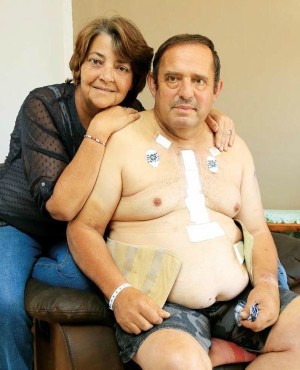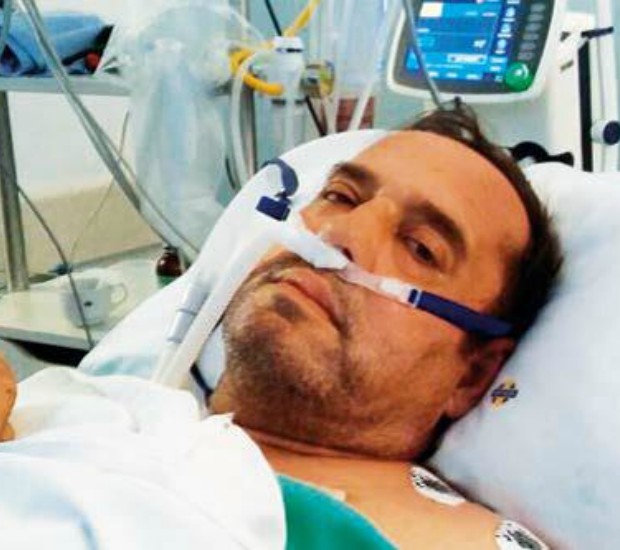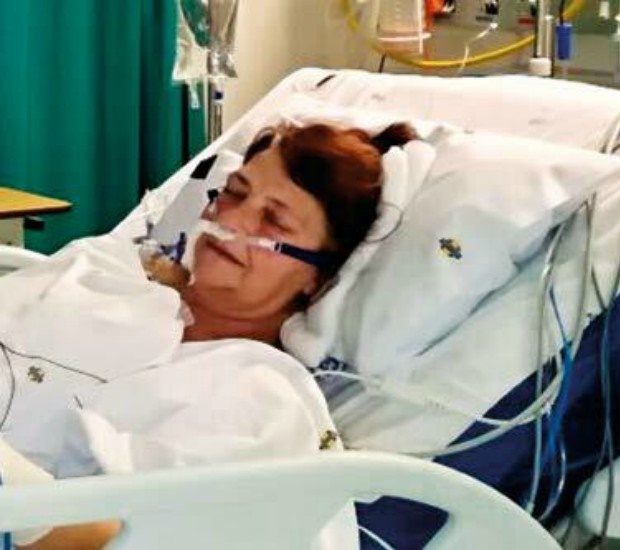
They lost their hearts to each other 26 years ago and they’re as in love today as they were back in their heady days of early romance.
Except now a different heart beats in each chest – and it’s a phenomenon so rare there aren’t even statistics for it.
Alria and Johan le Roux are both heart transplant recipients and the couple’s surgeon is as bowled over by the improbability of it all as the next person.
You wouldn’t find two heart transplant patients in a town of several thousand people, Dr Willie Koen says. “And here we have two people who are married and have each had a heart transplant.”
Koen transplanted a new heart into Alria (59) and little more than a year later did the same for Johan (53).
Both operations were performed in Cape Town’s Netcare Christiaan Barnard Hospital, named after the world-famous surgeon who performed the first successful human-to-human heart transplant 50 years ago.
“Years ago, when Professor Barnard was still alive, we used to read about him in YOU,” Alria says.
“We never imagined we’d each get a heart transplant in the hospital that bears his name.”
We’re visiting the couple in their home in Kuils River, Cape Town, a day after Johan was discharged from hospital.
Most of the time he wears a mask over his nose and mouth to keep germs at bay and he finds it a little difficult to talk. He’s still unsure about what he’s going to write in the thank-you letter to the donor’s family, he says.
Donors are kept anonymous but recipients can write to their loved ones to express their gratitude, and correspondence is passed on through the Organ Donor Foundation (ODF).
All Johan knows about the person who gave him his heart is he was a 43-year-old male.
Alria’s donor was a 28-year-old man, and she wrote to the family to thank them for allowing her to have the gift of life.
The Le Rouxs had battled with heart problems for years. Alria, a former tax clerk, has familial high cholesterol which causes her arteries to narrow. A heart attack in 2005 left her with a weakened heart, Koen says.
Johan, an ex-policeman, has had numerous blocked arteries as well as a heart attack and was spending more time in hospital than at home.
Since 1999 Johan has had 30 angiograms and 23 stent implants, while Alria had three angiograms and three stents after her heart attack in 2005.
An angiogram involves using a tiny camera inside an artery to assess the blood flow. During a stent implant a small mesh tube is inserted in an artery to keep it open.
Now the couple both have a new lease of life.
And when Johan says his heart feels light, he means it literally. Before the transplant, he had to carry a 1,5kg device to keep the mechanical heart he receive in 2015 going.
His own heart was removed at the time as it had only 10% functionality. “I couldn’t wait any longer and there weren’t any donor hearts available,” he says.
“It was either the mechanical heart or he’d die,” Alria adds.
The device was strapped to the left side of his body and connected via tubes to the mechanical heart beating in his chest.
“The device pumped blood to the heart and then to the other organs,” Alria explains.
For the past three years the device was part of their marriage. “It even had its own space on the bed between us.”
In 2014 Alria was fitted with a pacemaker and had to quit her job. She was placed on the waiting list for a donor heart that same year. Johan had been on the waiting list since 2013 but when a donor heart became available it was given to Alria because he could keep going with the mechanical heart.
On 26 September last year Alria finally got the long-awaited phone call. She says she and Johan were in bed and about to go to sleep when the hospital called to say they had a heart for her. Alria’s blood type is the rare AB.
“But I knew I’d get a heart. I believed in the Lord and trusted in Him.”
She packed her bag and they left for Christiaan Barnard Hospital, which was still in its old home in Cape Town’s Bree Street. She says their kids thought she wouldn’t make it – at that stage nobody in their family had had a transplant and they were expecting the worst.
Alria and Johan have two sons, Johan Jnr (25) and Jean-Claude (23), and Alria has a son, Rudi (39), and a daughter, Yolandi (35), from a previous marriage.
For the full six hours of Alria’s transplant Johan was sick with worry. But not only did she survive the operation, her heart problems are a thing of the past.
“I’m my old self again,” she says. “I can move things around in the house and play with my three grandkids in the park and I’m not tired anymore.”
Alria says she’s sad when she thinks about the young man who lost his life and his loved ones who had to make the tough decision to turn off his life support and donate his heart.
“I wonder if I could do that as a parent. It’s such a hard decision. But it’s the biggest gift you can give someone.”
On 30 October this year Johan also received a call from the hospital. There was a heart for him.
“This time we weren’t worried. We knew God and Dr Koen were busy with their work. We knew he’d come out of there alive and well,” Alria says.
And after nine hours in surgery at the new Christiaan Barnard Hospital on Cape Town’s Foreshore, he was ready to start the next chapter of his life.
“That man with the device strapped to his side wasn’t the man I married,” Alria says.
“Johan was the kind of guy who never asked anything of anyone. But with his bad heart he’d become dependent on others,” she says, wiping away tears.
It had been a difficult few years for them. In 2007 Johan was declared medically unfit to work and they struggled to make ends meet.
“We used to have everything,” Johan says. “Over the past few years I’ve had to collect scrap copper from old TVs to make a few rands.”
Alria does admin work for a school. Their medical aid is their largest burden but at least it covered their heart transplants.
“When you’re sickly and there are financial problems as well, it puts a lot of strain on a marriage,” Alria says.
“Both of us could’ve been dead because of our hearts but we kept praying.”
They’ll never swim in the sea on a hot summer day again because, Alria says, the medication they’re taking to keep their bodies from rejecting the donor hearts makes them extra-sensitive to sunlight.
“We’re not looking for any more trouble,” she says, laughing.
Then she turns to her husband. “This isn’t my own heart,” she says, “but I still love you with my entire being.”



 Publications
Publications
 Partners
Partners


















